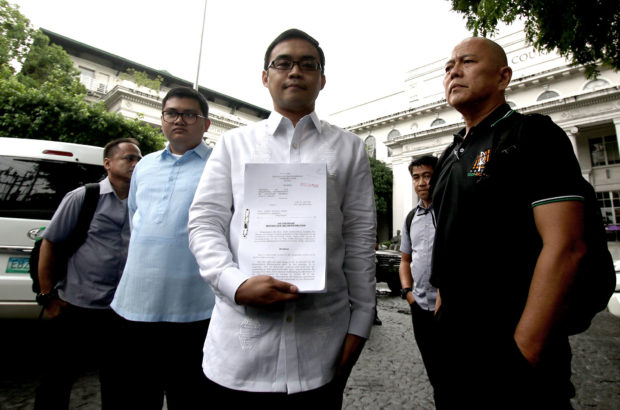Sereno appeals to SC: Do what is right and just

MOTION FOR RECONSIDERATION Through her lawyer, JustinMendoza, Maria Lourdes Sereno
files a motion for reconsideration onWednesday, seeking to reverse the Supreme Court decision
ousting her as Chief Justice. —RICHARD A. REYES
Maria Lourdes Sereno voiced hopes that all wasn’t lost in the motion for reconsideration she filed on Wednesday, urging her colleagues on the Supreme Court to invalidate their decision booting her out as Chief Justice.
In an unprecedented ruling on May 11, the high court voted 8-6 in finding Sereno “guilty of unlawfully holding and exercising the Office of the Chief Justice.”
Sereno, who drew President Rodrigo Duterte’s ire for defending judges on his “narcolist,” said the decision was replete with “legal and factual errors.”
The ruling, which granted the quo warranto petition brought against her by Solicitor General Jose Calida, “illustrates vividly the dire and far-reaching consequences of a denial of due process,” she said in her motion.
A quo warranto is a challenge to an official’s qualifications for the post.
Article continues after this advertisementDo what’s right
Article continues after this advertisement“This is essentially a plea to the honorable court to do what is right and just,” Sereno said in the motion her lawyers filed.
“Basic, fundamental and longstanding constitutional and legal rules and principles, and settled judicial precedents were ignored, set aside and reversed by the majority decision to achieve one end—the disqualification and ouster of the Chief Justice,” she said.
Calida, the government’s primary lawyer, initiated the quo warranto proceedings for Sereno’s failure to submit all her statements of assets, liabilities and net worth (SALNs) to the Judicial and Bar Council (JBC) when she applied for the top judicial post in 2012.
The JBC vets all candidates for jobs in the judiciary.
The majority ruling, penned by Associate Justice Noel Tijam, said Sereno flouted the Constitution and the Code of Judicial Conduct when she did not submit all her SALNs.
It said Sereno should have been disqualified at the outset, adding that a “member of the judiciary who commits such violations cannot be deemed to be a person of integrity.”
Not inherently immoral
Sereno said the majority ruling explicitly stated that her failure to submit all her SALNs should be considered “not ‘inherently immoral.’”
“And since this honorable court has essentially held that the nonfiling of a SALN is not ‘inherently immoral,’ this purported offense should not have negated the Chief Justice’s ‘integrity,’” she argued.
Moreover, she pointed out that the decision was rendered “null and void” after Tijam and five other associate justices refused to recuse themselves from the deliberations on Calida’s petition despite their palpable bias against her and in violation of her right to due process.
The five associate justices are Teresita Leonardo-de Castro, Diosdado Peralta, Lucas Bersamin, Samuel Martires and Francis Jardeleza. Except for Martires, the justices testified in the impeachment proceedings against her in the House of Representatives.
Said Sereno: “This honorable court has required [the] inhibition of trial court judges for far lesser reasons. Established jurisprudence on the inhibition of judges should be equally applied in this case.”
Only by impeachment
She said the disqualification of the six justices “is mandatory, grounded on actual bias and not mere participation in the hearings held by the House committee on justice.”
Sereno stressed that Section 2, Article XI of the 1987 Constitution mandates that “impeachable officials like the Chief Justice can be removed only by impeachment and not by any other means.”
“The proverbial path to perdition, which the majority of this court has taken, that is paved mainly with the intention of removing the Chief Justice by any means, can lead only to the destruction of judicial independence and the separation of powers,” she said.
“That is a consequence, unintended as it may be, that the respondent earnestly asks this court to veer away from,” she added. “The independence of the judiciary turns on this court’s adherence to this rule.”
According to Sereno, her colleagues’ decision is unconstitutional since they have no authority to unseat a member of the high tribunal outside of the impeachment process.
“Textually, impeachment is the only method for removal of appointive constitutional officers permitted under the Constitution,” she said.
Expedient procedure
Sereno said a difficult process deliberately chosen by the Constitution could not be substituted with an expedient procedure.
The majority decision said the quo warranto could proceed simultaneously with impeachment as the petition was a remedy for challenging an appointed official’s qualifications while impeachment was for acts made after appointment.
In the impeachment complaint, Sereno was accused of, among other charges, failing to declare her real wealth, buying a luxury car with government funds and making questionable decisions without consulting her fellow magistrates.